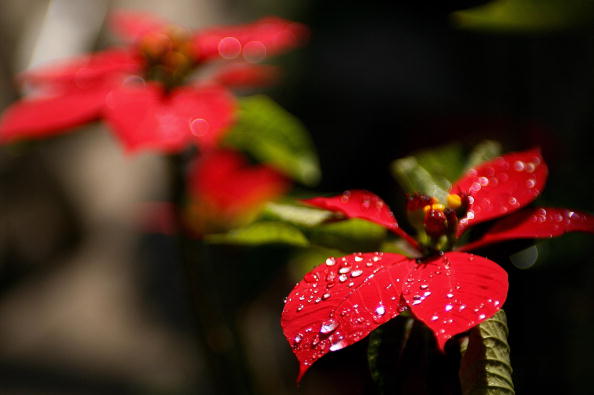It’s time to ditch ‘festive’ poinsettias and protect our peatlands
It’s a scandal that the government still allows our precious, carbon and wildlife-rich peatlands to be ravaged for an unnecessary horticultural purpose, writes Donnachadh McCarthy


The ubiquitous, peat-grown Christmas poinsettias are the ultimate symbol of our climate-trashing, nature-trashing consumer society. More than 8 million are sold in the UK every year but they will generally last just a few weeks, before their petals fall off and they get binned, along with their plastic pots and the precious peat that they were grown in.
It’s a scandal that the government still allows our precious, carbon and wildlife-rich peatlands to be ravaged for an unnecessary horticultural purpose. For decades, they and the major retailers have promised to phase it out but in yet another government consultation on peat sales launched last week, they are proposing to allow industrial peat extraction to continue until the end of the decade. The consultation also suggests watering down the proposed 2024 ban on amateur usage of peat, with the introduction of a “bag charge” on peat and mandatory labelling.
The UK’s peatlands are the equivalent of our rainforests in terms of the massive amounts of carbon that have been stored there over millennia. The government estimates that they contain over 3 billion tons of carbon. This is more than six times the emissions of the entire UK economy and is the equivalent of all the carbon stored in the forests of the UK, Germany and France combined.
Twelve per cent of our land is covered in peatlands but over 80 per cent of them have been damaged or destroyed by grouse moor burning, farming, inappropriately sited forestry, grazing or peat extraction. Over 50 per cent of peatlands protected as special sites for conservation are in an unfavourable or destroyed condition.
Peatlands are unique wildlife habitats and, if undamaged, protect lower-down communities from flooding. Over a quarter of our drinking water comes from our peatlands. The Office for National Statistics estimates that the restoration of peatlands requires an investment of about £8bn but would produce over £100bn in benefits to society over the next 80 years.
Accompanying the consultation was a new £4m fund for peatland “restoration” projects. This is a classic government tactic of announcing pitiful scraps of funding to “address” environmental damage, whilst simultaneously allowing the damage to continue.
Readers need to understand what peatland “restoration” means. It usually involves the removal of the drainage schemes that were installed to extract the peat or to convert them to forestry and agriculture, and rewetting the land. This allows the mosses to restart the painfully slow peat creation process. To restore the extracted peatlands to their original depth will take millennia if allowed to continue undisturbed. Peat extraction needs to be halted immediately. The industry has had decades to prepare.
After a wave of protests, the Tory government in 2010 proposed a “voluntary ban” to be implemented by 2020. But 11 years later, bagged peat and peat-grown potted plants are still on sale in almost every major retailer in the country.
The licensing of peat extraction is a devolved power in Scotland and the Scottish government has refused most new extraction licences. But the power to ban the sale and importation of peat (almost two thirds of UK peat sales are imported from equally precious peatlands located in Ireland and the Baltic states) is a UK reserved power.
Extraction is taking place on 144,000 of our 3 million hectares of peatlands, with an estimated 800,000m2 of peat is extracted annually. Yet the industry is worth only £32m a year. The amount of damage extraction is allowed to leave in its wake by the Tory government is utterly bizarre. The emissions from agriculture, extraction and grazing on all our peatlands amount to 23,000 kilotonnes of CO2 per annum. That is a whopping 7 per cent of domestic emissions, which in 2020 amounted to 326 million tons.
Sadly, I am old enough to remember the early 1990’s campaign to get B&Q to ban all peat sales. Many retailers then promised to stop selling peat from “protected areas”. So, I contacted a range of retailers to ask if they were still selling bagged peat and if their poinsettias were peat-free. None reported peat-free poinsettias.
Travis Perkins won the prize for already having a complete ban on peat sales. The Co-op came second, having banned bagged peat. Only 40 per cent of their potted plants are peat-free but they are aiming for 100 per cent.
The Waitrose ban on bagged peat begins in 2022 and they have “reduced peat” poinsettias. B&Q are selling bagged peat until 2024 but suppliers are “experimenting” with peat-free poinsettias. Sainsbury’s are “aiming to be peat free” but have set no date. Aldi, ASDA and Morrisons did not respond.
To keep up to speed with all the latest opinions and comment sign up to our free weekly Voices Dispatches newsletter by clicking here
So, whether or not you bought a poinsettia this Christmas, you can make a difference. Make a new year’s resolution to never again buy peat products. Sign the Wildlife Trust’s petition for an immediate ban on peat sales. Fill in the government consultation on peat sales. Be careful though. The form is designed to prevent filling in support for an immediate ban on industrial and amateur peat sales. Tick the “other” boxes and type support for an immediate ban.
Under the proposals for a peat charge or mandatory peat labelling, write in that you would prefer a ban, whilst labelling and a bag charge are better than nothing. The government must not be able to falsely claim there is support for a charge or labelling rather than a ban.
Let’s make 2022 the year we finally start protecting our precious peatlands and end the destructive scourge of peat sales forever.
Join our commenting forum
Join thought-provoking conversations, follow other Independent readers and see their replies
Comments
Bookmark popover
Removed from bookmarks